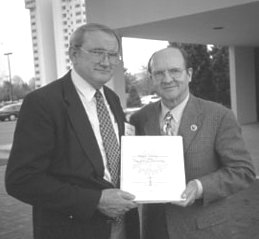High quality kernels earn prizes
The competition was stiff with over 90 entries for the Southeast Missouri pecan contest.
Samples came from Ste. Genevieve to Kennett, with over 50 of the samples from Perry County alone! Top prize of $100 was awarded to Fred Douglas of East Prairie for a medium-size pecan with nearly 56 percent kernel. A $50 second-prize went to Jen Sievers of Jackson for a medium- size pecan with 53 percent kernel. J. W. Pope took the $25 third-prize with his seedling pecan that produced a medium-size nut with 50 percent kernel.
Dr. Bill Reid, director of the Pecan Research Field Station at Kansas State University and Dr. Ken Hunt of the University of Missouri Agroforestry Center served as judges. Both were impressed with the high quality kernels, given how dry it was this past summer.
Getting priorities straight
Missouri pecan growers with native stands may take a hint from Kansas pecan specialist Bill Reid in setting their production priorities. Reid says most native plantation owners have their priorities out of kilter.
Typically, growers would list their production practices in the following priority list from most important to least important:
1. insect control; 2. grazing ; 3. tree thinning; 4. disease control; 5. nitrogen fertilization; and 6. surface drainage.
Compare this with Reid's list of priorities which he bases on economic returns: 1. tree thinning; 2. surface drainage; 3. nitrogen fertilization; 4. insect control; 5. disease control; and 6. grazing.
Selective thinning alone can boost nut yield by more than 300 pounds per acre and increase kernel grades by 3 to 4 percent, says Reid. Improving surface drainage and fertilizing with nitrogen can add an additional 200 pounds per acre.
Only after a grower develops fruitful trees should investments be made in pest control. Cattle grazing in a native pecan grove should be viewed solely as a labor-saving measure used to reduce the costs of mowing the groundcover, he says.

| Jim Jones, director of the Center for the Advancement of American Black Walnut presents a copy of the Nut Production Handbook for Eastern Black Walnut to Missouri Director of Agriculture, John Saunders. Copies are available from Jim Jones, P. O. Box 600, Stockton, MO 65785-0600, (417) 276-6010. |